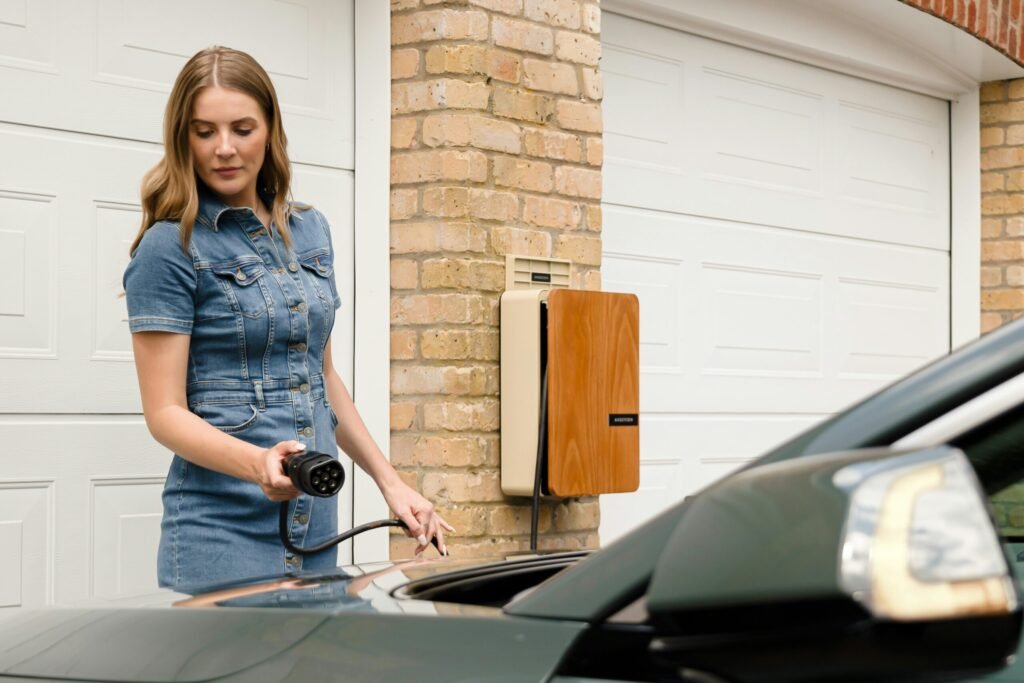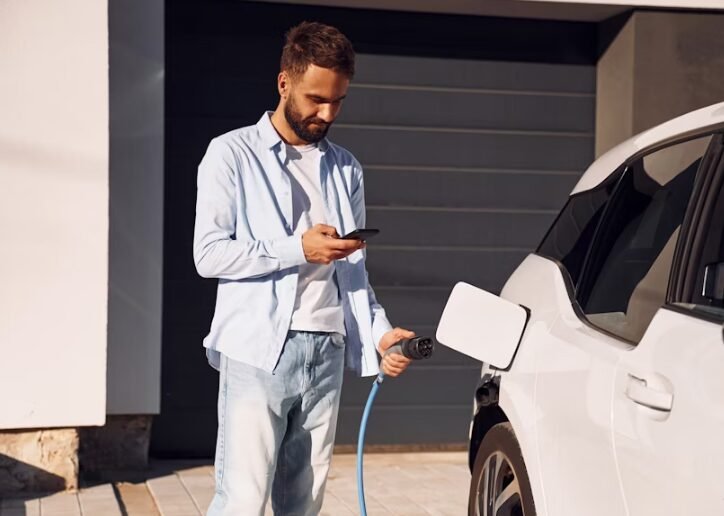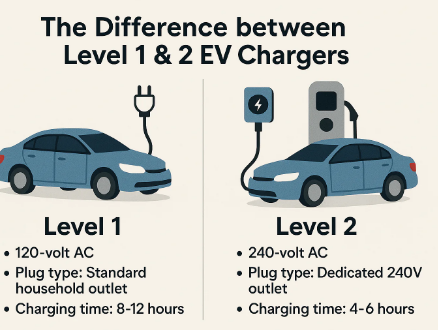Is It Cheaper to Charge EV at Home? As you consider switching to an electric vehicle (EV), one crucial aspect to understand is the cost associated with charging it. Electric vehicle charging expenses can vary significantly depending on whether you charge your vehicle at home or at public charging stations.

Charging your EV at home can offer convenience and potentially lower costs. However, the overall expense depends on several factors, including your electricity rate, the type of charger you use, and your vehicle’s battery capacity. Understanding these factors is essential to making an informed decision about where to charge your EV.
Key Takeaways
- Charging your EV at home can be more cost-effective than using public charging stations.
- The cost of home EV charging depends on your local electricity rates and the efficiency of your vehicle’s battery.
- Using a Level 2 charger at home can charge your EV faster than a standard Level 1 charger.
- Your overall savings depend on your driving habits and how often you charge your vehicle.
- Comparing your electricity rate with public charging station costs is crucial to determining the most economical option.
Understanding Home vs. Public EV Charging Costs
When it comes to charging your electric vehicle, understanding the costs associated with home and public charging is crucial. As an EV owner, you have the option to charge your vehicle at home or use public charging stations, each with its own cost implications.
Average Cost Breakdown for Home Charging
Charging your EV at home typically involves the cost of electricity, which can vary depending on your location and utility provider. On average, it costs between $3 to $5 per 100 miles to charge an EV at home, making it a relatively affordable option. Residential EV charging prices are generally lower than public charging rates.
Typical Public Charging Station Rates
Public charging stations, on the other hand, can charge varying rates depending on the network and location. Some public charging stations may charge by the kilowatt-hour (kWh), while others may charge a flat fee per session. Average costs can range from $0.20 to $0.50 per kWh, with some fast-charging stations charging even higher rates.
The Convenience Factor and Its Hidden Costs
While public charging stations offer convenience, there are hidden costs to consider, such as the time spent waiting for your vehicle to charge and potential parking fees.
“The convenience of public charging comes at a price, and EV owners should factor in these additional costs when deciding where to charge their vehicles.”
By understanding these costs, you can make informed decisions about your EV charging habits and maximize yourcost savings charging electric car at home.
Is It Cheaper to Charge EV at Home? A Cost Analysis
A closer look at the costs reveals that charging your EV at home can offer significant benefits of home EV charging, including cost savings. To understand the extent of these savings, it’s essential to analyze both your home electricity rates and the costs associated with public charging networks.
Calculating Your Home Electricity Rates
To calculate your home electricity rates, you’ll need to know your current electricity rate, which can be found on your utility bill. For example, if your rate is 12 cents per kWh and your EV consumes 3.3 kWh per 100 miles, driving 1,000 miles per month would cost approximately $3.96. You can use the following formula to estimate your monthly charging cost: (Monthly miles driven / EV’s efficiency in miles per kWh) * Electricity rate per kWh.

Public Charging Network Price Comparison
Public charging networks vary significantly in their pricing structures. Some charge by the hour, while others charge by the kWh. A comparison of popular public charging networks reveals that costs can range from $0.25 to $0.50 per kWh. For instance, charging a 60 kWh battery could cost between $15 and $30.
Real-World Savings Example for Popular EV Models
Let’s consider the savings for a popular EV model like the Nissan Leaf, which has a 40 kWh battery and an efficiency of 3.3 miles per kWh. Assuming an electricity rate of 12 cents per kWh, charging at home would cost about $4.80 for 100 miles. In contrast, using a public charger at $0.30 per kWh would cost $9.09 for the same distance, highlighting the saving money on EV charging at home. The table below summarizes the cost comparison for different EV models.
| EV Model | Home Charging Cost (100 miles) | Public Charging Cost (100 miles) |
|---|---|---|
| Nissan Leaf | $4.80 | $9.09 |
| Tesla Model 3 | $4.50 | $8.50 |
| Chevrolet Bolt | $4.20 | $8.00 |

By understanding your home electricity rates and comparing them to public charging costs, you can make an informed decision about the most cost-effective way to charge your EV, taking advantage of the residential electric vehicle charging comparison to maximize your savings.
Maximizing Cost Savings for EV Charging
As an EV owner, you can significantly reduce your expenses by optimizing your home charging setup. To achieve this, it’s essential to consider several factors that impact your overall cost.
Home Charging Equipment Investment and ROI

Investing in the right home charging equipment can lead to substantial long-term savings. While the initial cost of a Level 2 charger may seem high, it can pay for itself through reduced charging costs over time.
- Level 1 (120V): Uses a standard household outlet, ideal for slow charging overnight.
- Level 2 (240V): Requires a dedicated 240-volt charging station, perfect for faster charging.

Calculating the return on investment (ROI) for your home charging equipment involves considering factors like your current electricity rate, the cost of the equipment, and your daily driving habits.
Taking Advantage of Time-of-Use Electricity Rates
Many utility companies offer Time-of-Use (TOU) rates, which can significantly lower your charging costs if you charge your EV during off-peak hours.
- Understand your utility company’s TOU rate structure.
- Adjust your charging schedule to off-peak hours.
- Consider installing a smart charger that can optimize charging based on TOU rates.
Available Tax Incentives and Utility Rebates
Both federal and state governments, along with utility companies, offer various incentives for EV owners who invest in home charging infrastructure.
- Federal Tax Credits: Eligible for up to $1,000 for installing a home charging station.
- State and Local Incentives: Varying rebates and tax credits available depending on your location.
- Utility Rebates: Many utility companies offer rebates for purchasing and installing Level 2 charging stations.
By taking advantage of these incentives, you can offset the initial cost of your home charging setup and enjoy long-term savings on your EV charging expenses.
Conclusion: Making the Most Cost-Effective Charging Choice
Charging your EV at home can be a cost-effective option, with the average cost of home electricity being significantly lower than public charging station rates. By understanding your home electricity rates and taking advantage of time-of-use rates, you can maximize your savings. The benefits of home EV charging include convenience, cost savings, and the potential for tax incentives and utility rebates.
When evaluating whether it is cheaper to charge your EV at home, consider your driving habits, local electricity rates, and the cost of home charging equipment. By doing so, you can make an informed decision about the most cost-effective charging choice for your needs. Home EV charging cost can be as low as $3 to $5 per 100 miles, making it an attractive option for many EV owners.
FAQ
Is charging my electric vehicle at home cheaper than using public charging stations?
Generally, charging your electric vehicle at home is cheaper than using public charging stations, especially if you have a residential electricity rate that is lower than the rates charged by public charging networks.
How do I calculate my home electricity rates for EV charging?
To calculate your home electricity rates, you can check your electricity bill to determine your kilowatt-hour (kWh) rate, then multiply this rate by the amount of electricity your EV consumes per charge.
What are the typical costs associated with public EV charging?
Public EV charging costs vary by network and location, but on average, you can expect to pay between $0.25 and $0.50 per kWh, with some fast-charging stations charging more for the convenience of rapid charging.
Are there any benefits to using time-of-use electricity rates for EV charging?
Yes, using time-of-use electricity rates can help you save money on EV charging by taking advantage of lower electricity rates during off-peak hours, typically at night.
What is the return on investment (ROI) for home EV charging equipment?
The ROI for home EV charging equipment depends on several factors, including the cost of the equipment, your EV’s charging frequency, and the electricity rates in your area, but many homeowners see a payback period of a few years.
Can I get tax incentives or utility rebates for installing home EV charging equipment?
Yes, many governments and utilities offer tax incentives and rebates to encourage the adoption of EVs and the installation of home charging equipment, so be sure to check the programs available in your area.
How does the cost of charging an EV at home compare to the cost of fueling a gasoline-powered vehicle?
Charging an EV at home is generally significantly cheaper than fueling a gasoline-powered vehicle, with the exact savings depending on your local electricity rates and gasoline prices.






